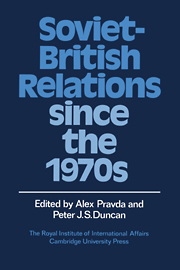Book contents
- Frontmatter
- Contents
- Contributors
- Acknowledgments
- 1 Introduction: pre-perestroika patterns
- 2 The historical perspective
- 3 Soviet perspectives on Britain and British foreign policy
- 4 British perspectives on the Soviet Union
- 5 The security dimension
- 6 Anglo-Soviet relations: political and diplomatic
- 7 The Soviet Union and the Left in Britain
- 8 Anglo-Soviet cultural contacts since 1975
- 9 Trade relations: patterns and prospects
- 10 Doing business with the USSR
- 11 Conclusions: Soviet-British relations under perestroika
- Index
9 - Trade relations: patterns and prospects
Published online by Cambridge University Press: 29 October 2009
- Frontmatter
- Contents
- Contributors
- Acknowledgments
- 1 Introduction: pre-perestroika patterns
- 2 The historical perspective
- 3 Soviet perspectives on Britain and British foreign policy
- 4 British perspectives on the Soviet Union
- 5 The security dimension
- 6 Anglo-Soviet relations: political and diplomatic
- 7 The Soviet Union and the Left in Britain
- 8 Anglo-Soviet cultural contacts since 1975
- 9 Trade relations: patterns and prospects
- 10 Doing business with the USSR
- 11 Conclusions: Soviet-British relations under perestroika
- Index
Summary
The United Kingdom was the first country to sign a trade agreement with the USSR, three-and-a-half years after the Bolshevik Revolution, and for many years up to and soon after the Second World War it was the biggest Western partner. Today each side represents only one per cent of the other's foreigntrade turnover. Despite fluctuations induced less by commercial than by political considerations, the bilateral relationship has been more stable than the corresponding trade of other Western partners. On statistical grounds it is even possible to speak of some priority among such partners for the UK when the USSR allocates its funds for convertible-currency imports; for significant periods the UK has done better in selling equipment to the USSR than British competitiveness on world markets would have justified. Nevertheless in the 1980s British equipment has done worse in the USSR than it has done elsewhere.
Over the full seven decades of Soviet trade with the United Kingdom, exchanges, as with other market economies, have been sensitive historically to the degree of international tension, from the end of the Civil War in Russia (1920) through the German invasion of the USSR (1941) to the Soviet invasion of Afghanistan (1979).
- Type
- Chapter
- Information
- Soviet-British Relations since the 1970s , pp. 193 - 214Publisher: Cambridge University PressPrint publication year: 1990

